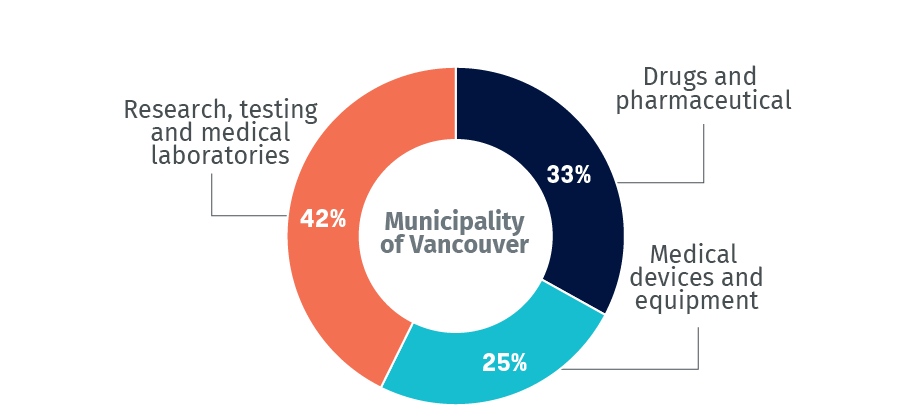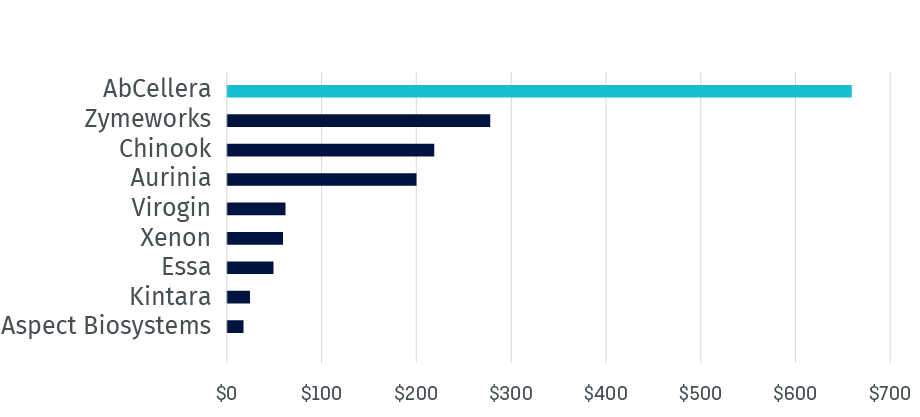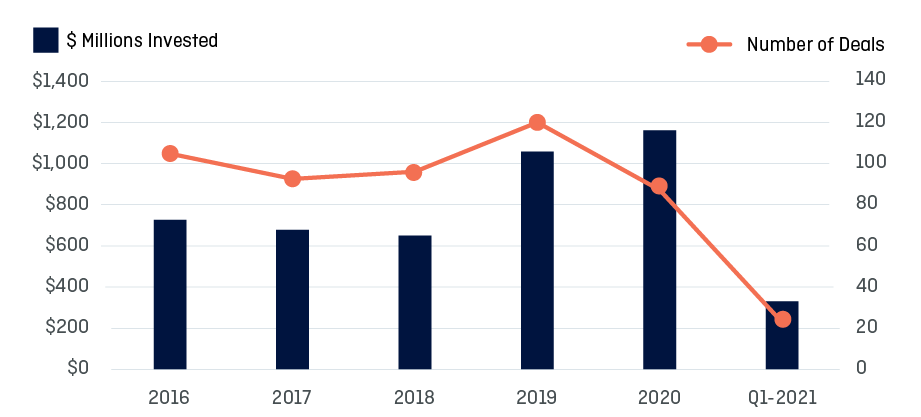Five Actions Essential to Supercharge BC’s Life Sciences Industry
British Columbia and the Vancouver region in particular has a proud history of supporting globally impactful life sciences organizations, and the industry employs an estimated one in 140 workers in the province.
2,000+
life sciences companies in BC
18,000+
jobs in BC in 2020
$2 billion+
market capital raised in 2020 in BC
Notable Vancouver companies include Stemcell Technologies (specialists in cell culture media creation) and Zymeworks (experts who develop protein therapeutics to treat cancer, autoimmune and inflammatory diseases). Recently, the rising stars of Acuitas Therapeutics (the technology underpinning the success of multiple COVID-19 vaccines), AbCellera (rapid antibody discovery) and Precision NanoSystems (RNA medicine) throughout the pandemic have further raised the region’s profile as a life sciences cluster.
Beyond its companies, British Columbia’s sciences sector is anchored by several provincially and federally funded research institutions, many of which are considered world-class in their respective fields. These institutions include the BC Centre for Excellence in HIV/AIDS, Michael Smith Laboratories, BC Cancer Agency, and TRIUMF, along with renowned research universities like Simon Fraser University and the University of British Columbia.
This industry’s ongoing growth in BC is a result of continuous talent development supported by a dynamic post-secondary system that enrolled 22,500 students in life sciences-related academic programs in 2017/18 – a 13% increase over four years (2018-2021). The sector has also benefitted from the doubling of Canadian venture capital investment in Canada since 2018.
The emergence of two significant life sciences hubs within our city – the AbCellera campus, a city block-sized HQ and biotech lab space, and the new $2 billion new St. Paul’s Hospital development creating an 18-acre hospital and health campus – will further enhance the conditions for IP development, commercialization, and the thriving of new startups and scaleups.
Despite recent successes and rising global attention to Vancouver and British Columbia’s life sciences sector, there are numerous outstanding opportunities to ensure the continued growth of this industry.
Other life sciences ecosystem stakeholders, including the Greater Vancouver Board of Trade, Life Sciences BC, and Business in Vancouver, have recently published their reports and studies related to the sector, which you may find at the end of this article.
VEC in turn has identified five areas of improvement we consider crucially important for unleashing BC’s full life sciences potential. Each of the following needs is shared or aligned in some way with barriers experienced by other sectors in the broader deep tech innovation ecosystem, such as cleantech.
1 Create the specialized spaces necessary for life sciences companies to thrive
Vancouver’s acute shortage of industrial space – the city currently has one of the lowest industrial vacancy rates in North America – presents a challenge to local life sciences companies as they search for places to scale. The industry especially struggles to find or build suitable wet labs – a type of specialized laboratory designed to handle various types of chemicals and potential wet hazards.

Source(s): VEC analysis; Business Register, Statistics Canada
Actively intensifying, diversifying and expanding industrial spaces in the region will help solve this issue, as will demystifying and streamlining permitting and zoning processes related to the construction of wet labs. In Vancouver, this will require the close cooperation of industry with municipal and regional bureaucrats and planners. Land planning in particular is a fraught topic, but there are deeply underutilized spaces in the city that could be densified with political will and public support.
2 Review and leverage government purchasing and procurement policies
Governments and health authorities should capitalize on the momentum of recent local-first procurement practices. Smartly leveraged, government purchasing of life sciences products and services – such as vaccines, health tech and pharmaceuticals – helps build economic prosperity and resilience. We need federal and provincial governments to support this industry not only in developing products and IP but also by purchasing these products when appropriate, just as locally produced masks, respirators, hospital gowns and sanitizers were produced.
What this looks like in practice could vary, depending on the kind of life or health sciences product in question. If it is applied health tech or the manufacturing of medical devices or laboratory testing, this could be as simple as auditing various governments’ procurement plans and identifying where imported items could be substituted for made-in-BC solutions. If, however, it at all involves prescriptible vaccines, therapeutics or pharmaceuticals, the barriers to procurement increase significantly.
When it comes to certain drug therapies and vaccines, Canada and British Columbia in particular have some of the most rigorous requirements for clinical trials and drug approvals. While many of these conditions are in place for safety reasons, it could be worth revisiting some of the guidelines to ensure they are responsible and uphold public health and safety considerations while enabling the rigorous testing and trialling necessary to deliver strong products in the health sciences subsector. This is especially relevant as we begin to build vaccine production and therapeutics discovery capacity locally – Vancouver-based Precision NanoSystems will begin producing 240 million vaccine doses a year by 2023 –
3 Provide smarter early-stage funding to facilitate IP translation
Canada is renowned for diverse R&D funding supports by government and academia, and our companies and universities have a high output of quality intellectual property (IP). However, most scientific research and development grants do not support IP translation – a critical early-stage process whereby technology or concepts may be explored or “translated” to a product or service.
Due to this critical early-stage funding gap, Canada has a relatively low success rate compared to other countries of turning scientific prowess into commercial success. As a result, patents, companies and talent may seek support overseas to reach their full potential.
This could be mitigated by smarter, intentional funding programs for the IP translation gap, best practice commercialization programs and better education provided through publicly funded research institutions (PFRIs).
“B.C. is worthy of exceptional life science investment because we are a place of outstanding science and talent.”
Ali Ardakani, Founder of Novateur Ventures, writing for Business in Vancouver
4 Attract and establish more scale-up capital committed to life sciences
While Vancouver’s recent capital attraction and venture deal performance was overall stellar, even a shallow breakdown reveals that the massive volumes were skewed by massive exits by Abcellera and Chinook, whose phenomenal performances distorted reporting even at the national level.
Life Sciences Market Capital Raised, 2020

Source(s): Greater Vancouver Board of Trade and Novateur Ventures
Canada Life Sciences VC Investment

Source(s): Avison Young
Vancouver must increase the volume of growth equity funds that are committed to taking our early-stage life sciences companies to scale. We must strive to attract global and pan-Canadian institutional investors and establish more local investors and investor networks with the capabilities, confidence and willingness to invest in early-stage companies and then support them for the long haul.
Non-private equity funding is equally important and BDC’s new Deep Tech Fund is an exciting development that could help our exciting life sciences companies to stay, prosper, and grow locally while returning significant economic benefits.
5 Attract high impact foreign life sciences companies of strategic importance to Vancouver
As part of our mandate, VEC continually works with investors, multinationals and startups looking to set up and expand their presence in our city. In close collaboration with our partners at Life Sciences BC, Invest in Canada, and the Province of British Columbia, and other regional stakeholders, VEC commits to attracting more globally renowned life sciences companies to our city – much as we have succeeded in doing so over the past 10 years for other sectors, such as technology and the green economy.
One approach to this is to promote Vancouver – and its outstanding life sciences companies – on the global stage, through events, media outreach and marketing communications.



